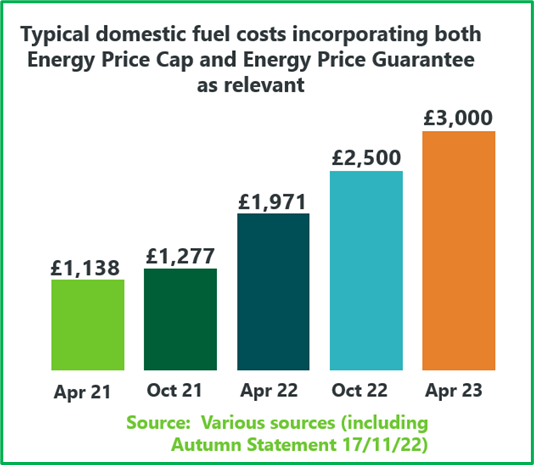What’s happening to my energy costs?
Energy prices were a big concern in 2022, and sadly look set to remain in the headlines throughout 2023. So, what will typical energy costs per household be this year?
Two forms of protection
Firstly, it’s worth highlighting that the prices paid by domestic users of electricity and gas are now both smoothed and protected by two different initiatives.
On the one hand, there is the Energy Price Cap (EPC) – an explanation of which can be read here.
And since October last year, there has also been a further layer of protection overlaying the EPC in the form of the government’s Energy Price Guarantee (EPG). Details of that policy can be read here.
As things stand, the EPG is currently lower than the EPC, and this, therefore, limits the typical energy cost for dual-fuel gas and electricity per household to £2,500 per annum. Unless there is a sharp fall in energy costs in the next few weeks, it is to be expected that the new level of Energy Price Guarantee (£3,000 per annum) will apply from April 2023, with that level potentially continuing to apply through to the end of March 2024.
However, estimates produced by energy consultancy Cornwall Insight on 4 January 2023 suggest that energy costs might reduce from the £3,000 a year estimated in April to around £2,800 a year per household from July 2023 onwards. There is much uncertainty to these figures, but it remains that energy costs will still be far higher than they were a year ago for all domestic users on either measure.
What does that really mean?
If that all sounds a bit confusing (which it probably does!), then perhaps the simplified chart below will help.
This shows the typical capped cost of energy in recent years (with either the EPC or EPG applying as relevant), and as you can see costs are still escalating for households:

There will however be some more targeted state support in the form of additional cost-of-living payments for some households (typically low-income and/or those receiving state benefits) from April 2023. Details of the government announcement on these payments can be read here.
For all other households, the £3,000 level is likely to apply from April 2023, without any additional state financial support available.
It’s also worth noting that the above figure is only a “typical” cost. In other words, the cost per unit of energy is capped, but not the total expenditure per property. Households might well spend less or more than the average figures shown.
Where does that leave you?
So, whilst unit costs are capped, your overall household spending on energy is not.
It follows that it is still very much in your financial interests to control your energy spending in the year ahead.
With this in mind, the government has recently launched the “It all adds up” campaign to alert consumers to the value of energy-saving measures. The campaign pages can be found here.
It’s certainly worth taking a look at these measures, and also looking out for other suggestions that are often to be found on your energy suppliers’ website, in the national and local media, and via social media.
We would also encourage you to view our “Controlling spending” video on the Financial Wellbeing Hub, as this includes a section on energy cost-saving options to consider, along with many other cost-saving ideas.
The reality is that high energy prices are likely to be with us all for some time to come, and any small savings we can make in our daily usage can make a big difference over time.
Don’t panic!
Finally – and as we mention often in the videos – there is plenty of free-to-access support and help for those struggling to pay. It’s often a good idea to make contact with your energy supplier to see what help they can offer.
So please don’t panic if you are in difficulties – help is available, and our Financial Wellbeing Hub is a good place to start looking for that support.
This document is provided for information only and is correct at the time of writing (05/01/2023). Links to websites do not indicate any endorsement of that website or service by Partners&.
- For Businesses
-
Industry Types
Back
- Industry Types
- Advanced Beauticians, Tattooists & Piercers
- Automotive
- Care Sector
- Commercial Property
- Construction
- Contractors insurance
- Energy & Renewables
- Entertainment
- Fine Art
- Fire Safety
- Food & Drink
- Haulage & Logistics
- Hotels, Restaurants & Leisure
- Manufacturing
- Marine
- Media & Digital
- Medical Practice Insurance
- Mergers & Acquisitions
- Recruitment & Umbrella
- Retail & Wholesale
- Rural insurance
- Science & Technology
- Sports & Leisure
- Waste Management
- Insurance Types
- Buildings, Contents & Property Damage
- Business Interruption
- Commercial Combined
- Commercial Fleet Insurance
- Cyber
- Directors & Officers Liability
- Employers' liability
- Flood Risk Insurance
- Goods in Transit
- Group Business Travel
- Legal Indemnity
- Management Liability
- Product Liability
- Professional Indemnity
- Public Liability
-
Insurance Types
Back
- Industry Types
- Advanced Beauticians, Tattooists & Piercers
- Automotive
- Care Sector
- Commercial Property
- Construction
- Contractors insurance
- Energy & Renewables
- Entertainment
- Fine Art
- Fire Safety
- Food & Drink
- Haulage & Logistics
- Hotels, Restaurants & Leisure
- Manufacturing
- Marine
- Media & Digital
- Medical Practice Insurance
- Mergers & Acquisitions
- Recruitment & Umbrella
- Retail & Wholesale
- Rural insurance
- Science & Technology
- Sports & Leisure
- Waste Management
- Insurance Types
- Buildings, Contents & Property Damage
- Business Interruption
- Commercial Combined
- Commercial Fleet Insurance
- Cyber
- Directors & Officers Liability
- Employers' liability
- Flood Risk Insurance
- Goods in Transit
- Group Business Travel
- Legal Indemnity
- Management Liability
- Product Liability
- Professional Indemnity
- Public Liability
-
Wellbeing, Health & Protection
Back
- Industry Types
- Advanced Beauticians, Tattooists & Piercers
- Automotive
- Care Sector
- Commercial Property
- Construction
- Contractors insurance
- Energy & Renewables
- Entertainment
- Fine Art
- Fire Safety
- Food & Drink
- Haulage & Logistics
- Hotels, Restaurants & Leisure
- Manufacturing
- Marine
- Media & Digital
- Medical Practice Insurance
- Mergers & Acquisitions
- Recruitment & Umbrella
- Retail & Wholesale
- Rural insurance
- Science & Technology
- Sports & Leisure
- Waste Management
- Insurance Types
- Buildings, Contents & Property Damage
- Business Interruption
- Commercial Combined
- Commercial Fleet Insurance
- Cyber
- Directors & Officers Liability
- Employers' liability
- Flood Risk Insurance
- Goods in Transit
- Group Business Travel
- Legal Indemnity
- Management Liability
- Product Liability
- Professional Indemnity
- Public Liability
- Risk Management
Back -
Industry Types
- For Individuals
-
Private Client
Back
- Industry Types
- Advanced Beauticians, Tattooists & Piercers
- Automotive
- Care Sector
- Commercial Property
- Construction
- Contractors insurance
- Energy & Renewables
- Entertainment
- Fine Art
- Fire Safety
- Food & Drink
- Haulage & Logistics
- Hotels, Restaurants & Leisure
- Manufacturing
- Marine
- Media & Digital
- Medical Practice Insurance
- Mergers & Acquisitions
- Recruitment & Umbrella
- Retail & Wholesale
- Rural insurance
- Science & Technology
- Sports & Leisure
- Waste Management
- Insurance Types
- Buildings, Contents & Property Damage
- Business Interruption
- Commercial Combined
- Commercial Fleet Insurance
- Cyber
- Directors & Officers Liability
- Employers' liability
- Flood Risk Insurance
- Goods in Transit
- Group Business Travel
- Legal Indemnity
- Management Liability
- Product Liability
- Professional Indemnity
- Public Liability
-
Family & Home
Back
- Industry Types
- Advanced Beauticians, Tattooists & Piercers
- Automotive
- Care Sector
- Commercial Property
- Construction
- Contractors insurance
- Energy & Renewables
- Entertainment
- Fine Art
- Fire Safety
- Food & Drink
- Haulage & Logistics
- Hotels, Restaurants & Leisure
- Manufacturing
- Marine
- Media & Digital
- Medical Practice Insurance
- Mergers & Acquisitions
- Recruitment & Umbrella
- Retail & Wholesale
- Rural insurance
- Science & Technology
- Sports & Leisure
- Waste Management
- Insurance Types
- Buildings, Contents & Property Damage
- Business Interruption
- Commercial Combined
- Commercial Fleet Insurance
- Cyber
- Directors & Officers Liability
- Employers' liability
- Flood Risk Insurance
- Goods in Transit
- Group Business Travel
- Legal Indemnity
- Management Liability
- Product Liability
- Professional Indemnity
- Public Liability
- Private Office
- Client portal
- Personal Cyber Protection
Back -
Private Client
- Claims Support
- Sustainability
- About Partners&
- News & Insights
- Contact Us
